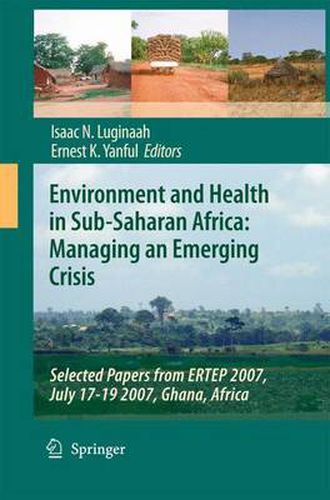Readings Newsletter
Become a Readings Member to make your shopping experience even easier.
Sign in or sign up for free!
You’re not far away from qualifying for FREE standard shipping within Australia
You’ve qualified for FREE standard shipping within Australia
The cart is loading…






This title is printed to order. This book may have been self-published. If so, we cannot guarantee the quality of the content. In the main most books will have gone through the editing process however some may not. We therefore suggest that you be aware of this before ordering this book. If in doubt check either the author or publisher’s details as we are unable to accept any returns unless they are faulty. Please contact us if you have any questions.
This book is the second edited compilation of selected, refereed papers submitted to ERTEP 2007. The book is organized into 10 chapters along four of the key themes that were discussed at the conference: Environmental Health Management; Mining and Environment; Environmental Monitoring and Policy Development; and Susta- ability and Social Responsibility. It is hoped that the contents of the book will p- vide an insight into some of the environmental and health management challenges confronting the developing world and the steps being taken to address them. The ?rst three chapters under the Environmental Health and Management theme discusses issues related to food security and related environmental distress in sub- Saharan Africa. Chapter 1 argues that pervasive poverty and low agricultural p- ductivity are important factors in understanding food insecurity in the region, and broader global processes are examined. This chapter maintains that while poverty undermines individual and household access to suf?cient food through market p- chase, land inequalities, corruption, structural adjustment programs, civil con?ict, HIV/AIDS and the role of the World Trade Organization Agreement on Agric- ture are decisive. The authors argue that achieving food security in sub-Saharan Africa requires policies and actions that are integrated with efforts to reduce poverty, enhance livelihoods and incomes and increase agricultural output, while also paying attention to underlying structural factors that bear on agriculture in the region.
$9.00 standard shipping within Australia
FREE standard shipping within Australia for orders over $100.00
Express & International shipping calculated at checkout
This title is printed to order. This book may have been self-published. If so, we cannot guarantee the quality of the content. In the main most books will have gone through the editing process however some may not. We therefore suggest that you be aware of this before ordering this book. If in doubt check either the author or publisher’s details as we are unable to accept any returns unless they are faulty. Please contact us if you have any questions.
This book is the second edited compilation of selected, refereed papers submitted to ERTEP 2007. The book is organized into 10 chapters along four of the key themes that were discussed at the conference: Environmental Health Management; Mining and Environment; Environmental Monitoring and Policy Development; and Susta- ability and Social Responsibility. It is hoped that the contents of the book will p- vide an insight into some of the environmental and health management challenges confronting the developing world and the steps being taken to address them. The ?rst three chapters under the Environmental Health and Management theme discusses issues related to food security and related environmental distress in sub- Saharan Africa. Chapter 1 argues that pervasive poverty and low agricultural p- ductivity are important factors in understanding food insecurity in the region, and broader global processes are examined. This chapter maintains that while poverty undermines individual and household access to suf?cient food through market p- chase, land inequalities, corruption, structural adjustment programs, civil con?ict, HIV/AIDS and the role of the World Trade Organization Agreement on Agric- ture are decisive. The authors argue that achieving food security in sub-Saharan Africa requires policies and actions that are integrated with efforts to reduce poverty, enhance livelihoods and incomes and increase agricultural output, while also paying attention to underlying structural factors that bear on agriculture in the region.